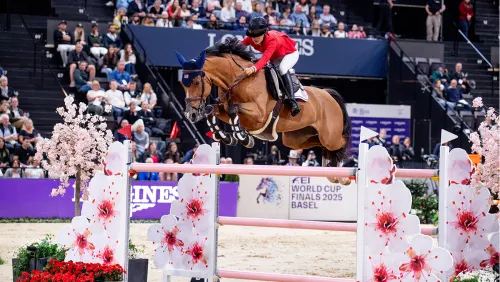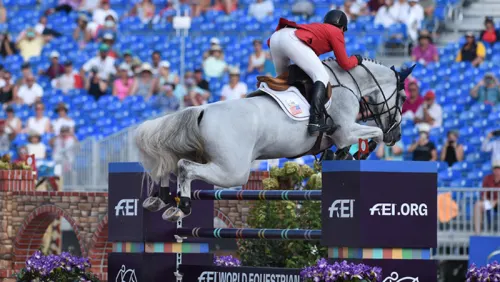With a gold medal around his neck, André Thieme opened his arms, welcoming champagne sprayed at him by Peder Fredricson. He savored the moment: He just had won the individual final at the Longines FEI Jumping European Championships, held Aug. 31-Sept. 5, in front of a home crowd in Riesenbeck, Germany. A lifetime of anticipation led to that moment, and he wanted, literally, to soak it all in.
Just a few months prior, I called Thieme following his March 28 win in Great American $1 Million Grand Prix at HITS Ocala (Florida). It was his fourth HITS $1 Million class win, as the 46-year-old German regularly made the trip stateside. But excitement filled his chest then not so much over that victory, but over what that victory could morph into. In DSP Chakaria, he believed he’d found the horse to fulfill dreams still left unchecked on his bucket list. Timing and bad luck had hindered his past chances of representing Germany on the championship level, but the win in Florida kick-started his bid for the Tokyo Olympic Games and the European Championships.
“This is the horse of my lifetime, and she’s just so complete in every way: careful, scope, blood, sound, fighter. She’s just so complete that there is a chance with that horse,” Thieme said at the time. “She’s extra careful; she’s extra scopey, and she’s extra flexible. She’s extra jointless and extra blood and extra hard. Now even extra quick. So, all those add up to just being a superstar. They didn’t have the Olympics last year; she would have been too green. Now all of a sudden, I’m in that race to do it. So, it looks like it was all meant to be. I’m happy that I have her now, and I’m not regretting anything.”

André Thieme takes it all in after winning the Longines FEI Jumping European Championships individual gold medal. Christophe Taniere/FEI Photo.
The pair made the Olympic team, but 4 faults kept them out of the individual final, and they picked up 8 faults during the team final. When Thieme’s teammate World No. 1 Daniel Deusser retired, so did German hopes for a medal. But at the urging of chef d’equipe Otto Becker, Thieme saddled up again for last week’s European Championships. There, his double-clear efforts brought Germany the silver medal in the team competition. His 11-year-old German Sport Horse mare (Chap 47—Askaria 3, Askari 173) maintained her form, and, although they took the one rail they had in hand, the pair clinched the gold medal from Switzerland’s Martin Fuchs and Leone Jei.
“I’m just as much in love with that horse as I am with my wife—and she accepts that!” Thieme joked at the press conference.
“I hit the front rail, and I thought, ‘We have a long way to go,’ ” he said. “So I tried to stay calm, and she stayed calm with me, and I don’t know how many times I can say it, but I’m very blessed with that horse! It’s something very special.”
We caught up with Thieme to relive his whirlwind year.
Tell me about your year since you won at the Great American $1 Million Grand Prix.
ADVERTISEMENT
It was a little bit up and down because when I finally made it to the Olympics, we were all excited and on fire. The dream came true. But then things were a little bit too early and too green for my mare with the lights, the jumps and everything—altogether just a little bit too nervous. So that’s why we didn’t win the medal, and that was, of course in Germany, a big thing. I had to go through some real pressure. There were not-nice moments in Tokyo with me being for the whole time pretty much stuck in a hotel room. Then things didn’t go perfect. That was really a little bit mentally hard.
So, with all that before, of course now it’s unbelievable. I feel like all of a sudden, it’s release and looseness again and happiness. It was a big decision after Tokyo; I wasn’t sure if it was the right thing to do to go straight to the Europeans. Our chef d’equipe said, “No, you go because I’m 100 percent sure your mare is going to do it. And if she feels fresh after Tokyo, then just do it because it’s going to be good for her and for you. We are counting on you, and we are planning with you for the World Championships next year.”
They wanted us to have that experience to learn about that situation a little more because [riding on a championship] is just such a big difference, such big pressure. Riding for your country at a big tournament like that is definitely very different to a million-dollar class in a show where you do everything for yourself.
How did you turn everything around for the Europeans ?
We didn’t even do a show. We just went a grass field two times to jump small jumps—just to feel if she got stuck at the Olympics or if she still [had her natural confidence and was] not backed up at the jumps. Because [in Tokyo] she was backed up, too careful. But then right away, the first training after Tokyo, we realized she took it unbelievably. She felt so full of confidence—extra excited—that we realized that there wasn’t any damage for her. She fought through that Olympics, she fought until the end. That’s when we decided, “OK, she feels fresh enough and powerful enough—and definitely brave enough—to just try it.”
Arriving at the European Championships with all that pressure in my stomach and in my head, I didn’t sleep too well for weeks. It was just really pressure for me because things didn’t go great at the Olympics. That’s what made it so hard for me.
But then the first day, the warm-up, in Riesenbeck was so perfect and so loose that everybody right away realized: She is in top form and not even a little bit nervous or backed up. I right away got a great feeling. And then I was really fast in the first speed class. I got a rail in the end, but I was still in the top 20 and got a good result for the team even with that rail. More and more, we realized that she’s just in great shape. And then she started to go clear.
Thieme and DSP Chakaria’s winning individual round at the European Championships:
ADVERTISEMENT
She went double clear in the Nations Cup, and I never even a little bit thought about the individual. All I wanted to do was to be useful and good for the team. Then when I was the only double-clear on our German team, and I was really able to help for that silver medal—and we almost won gold, almost—then things turned into fun. All of a sudden, the pressure was really gone. I had fun; I started to enjoy it.
I realized my horse really feels good, and things are going the right way on its own. Coming from 17th spot to seventh and then into fifth and then into second over the days—just climbing up the list with all those clear rounds that she produced—then we realized there’s a real chance at those individuals. She went clean again, and I went from second to first. I was able to go last in the final round, that’s when we were just hoping to hold it together mentally and stay calm because everybody realized, at home in Germany, the crowd was waiting for that. It was beautiful weather, and a lot of people in the stadium, and everybody was hoping, so it all was meant to be in the end.
I can only imagine that this gold medal—after the hardships of Tokyo—proves to you that you and your horse belong there on that championship stage.
I was really strong in my head before the Olympics. After all those wins this year and all those double-clears we had in those Nations Cups after the Million, we were a little bit on fire. For many, many famous riders, we were already like at the Olympics—some kind of silent favorite. There was talk about us, and I realized that, and I was strong in my head. I was ready for that. And then tons of things went the wrong way at the Olympics, and all of a sudden she was too good, too green and too careful.
Now, it’s such a big release. It’s very satisfying to make Otto Becker, our chef d’equipe, happy. He was fighting for me, and he was giving me that second chance right after again because he was believing so hard in us as a pair—that makes me extra happy. To see that he’s happy about his position and everybody’s satisfied—not only us.
Looking back on it all, what does this gold medal mean to you, especially with this horse you consider your horse of a lifetime?
It’s definitely so freaky good. It’s giving us calmness, and it gives us the time to stay calm and natural all the time. Now all of a sudden, we are in that position, for the next championships, to be in a little bit and to just rest her and be ready at the right moment and not have to hustle all year long to get in that position. That’s what makes it special now. And that’s what we were—it’s the most powerful thing.
Do you have a place where you are going to hang these medals?
I have a pretty cool party room, and there will be room for that kind of stuff.














